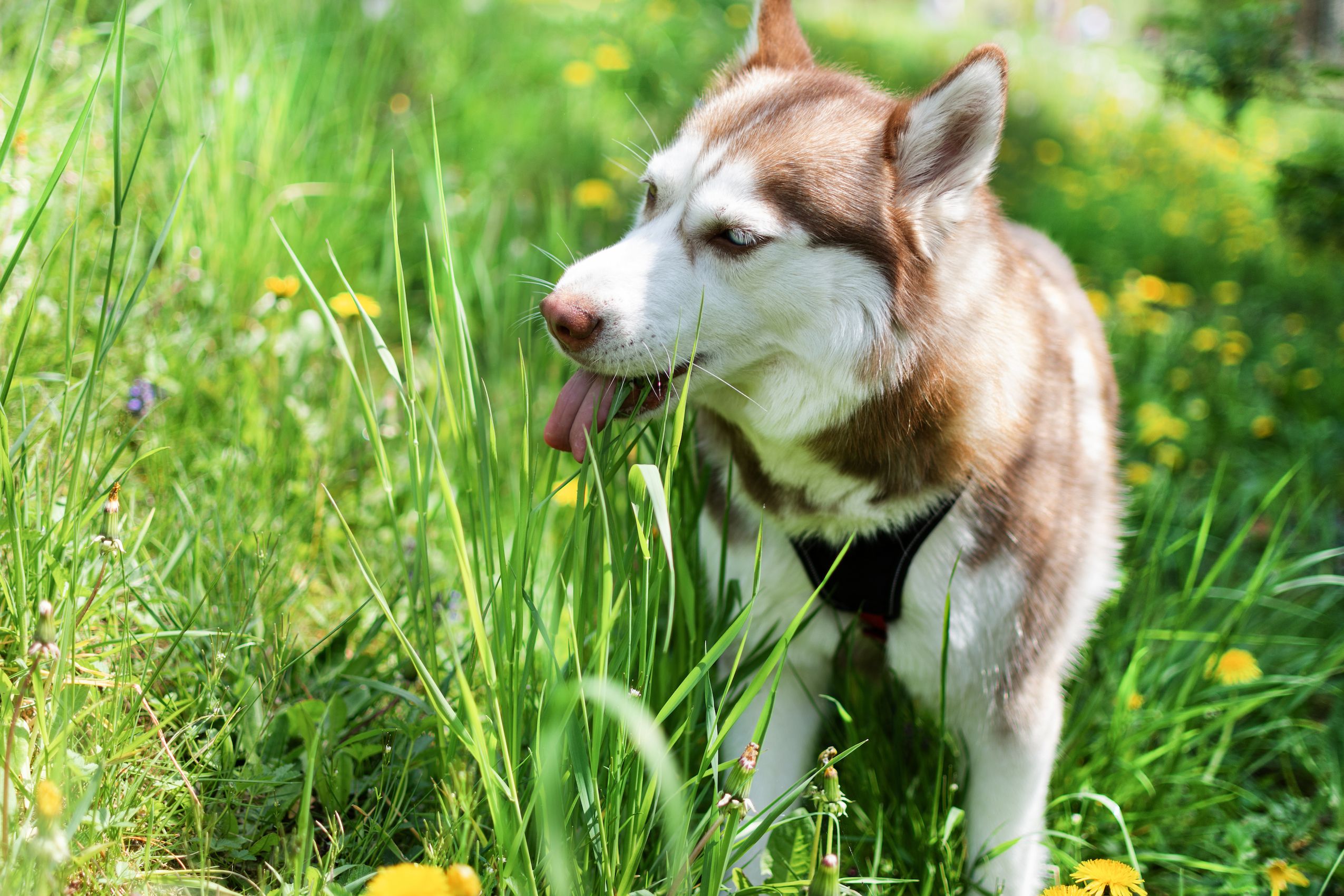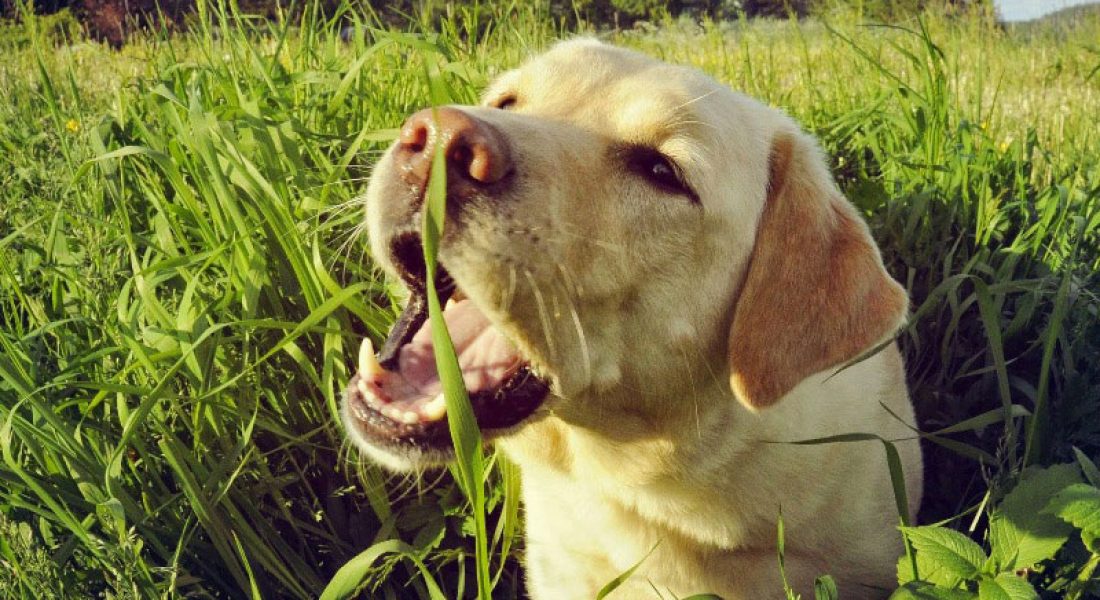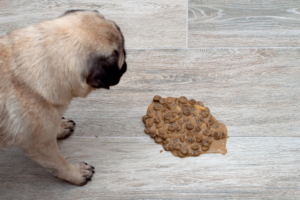Have you ever wondered why dogs eat grass? It’s a curious behavior that many dog owners have witnessed. While the exact reason has yet to be fully understood, several theories exist. Some believe dogs eat grass to soothe an upset stomach or induce vomiting. Others suggest it may be an instinctual behavior inherited from their wild ancestors.
This article will answer the question, “Why do dogs eat grass?” and explore the possible explanations behind this behavior.
/__opt__aboutcom__coeus__resources__content_migration__mnn__images__2019__08__dog_eating_grass-4edc7d8666bd49dfac5094566ec4c088.jpg)
Why Do Dogs Eat Grass?
Here are the possible reasons why dogs eat grass, according to top veterinarian experts:
-
Upset Stomach
It’s believed that dogs eat grass to help soothe their upset stomachs. The grass may act as a natural laxative, helping to move food and waste through the intestines more quickly.
Also, grass contains fiber and other nutrients that can help to settle an upset stomach. And because grass can be fibrous, it may help to relieve constipation in dogs.
-
Your Dog is Bored
Another possible reason your dog eats grass may be because they are bored. If your dog has plenty of energy but nothing to do with it, they may snack on some grass instead.
Plus, if your dog feels ignored they may eat grass for a way to get attention from their owners.
-
Nutritional Needs
It could also be that your pet is trying to fulfill a nutritional need by eating grass. Grass contains many essential vitamins and minerals important for a healthy diet.
For example, it contains Vitamin A, essential for eye health and vision. It also provides magnesium, calcium, potassium, and iron – all of which can help improve your dog’s overall health.
-
Ancestral Instinct
The next explanation for why dogs eat grass is that it may be an instinctual behavior inherited from their wild ancestors.
Wild canines, such as wolves and coyotes, consume large amounts of vegetation. This could have been passed down through generations of domesticated dogs, resulting in the occasional urge to nibble on some grass.
-
Grass tastes good
The last possible explanation is that your dog just loves the taste of grass. For some dogs the taste of grass can be rather appealing, and they may eat it as a form of exploration. In some cases, dogs may even develop a habit of eating grass regularly, especially if they think it’s rather delicious!
No matter what the reason, it’s important to note that grass eating is generally considered to be a harmless behavior and should not cause any health concerns. However, if you are worried about your pet’s diet or habits, it may be best to ask your veterinarian for advice.

Why Did My Dog Eat Grass And Then Throw It Up?
The most common reason your dog may eat grass and then throw it up is because they have an upset stomach. Eating grass can cause dogs to vomit, which can be rather concerning for pet owners, However, in most cases dogs eat grass to make themself vomit when they’re feeling unwell, which can have its benefits. Grass also helps move food and waste through the intestines more quickly and can settle an upset stomach by providing essential vitamins, minerals, and fiber.
Its good to note, if your dog is vomiting after eating grass you should always monitor them closely. And if the vomiting persists, it’s best to contact a veterinarian to find a healthy solution.
How Do I Stop My Dog From Eating Grass?
If you are concerned about your pet eating too much grass, there are a few steps you can take to discourage the behavior.
First, ensure your dog gets plenty of exercise and engaging in stimulating activities. This will help keep them occupied and less likely to snack on grass out of boredom. You can also try offering them alternatives, such as chewing toys or treats. This can help to redirect their attention and satisfy their craving for something to chew on.
Finally, make sure they are eating healthy food on a daily basis that is both nutritious and delicious! Grass eating can be a sign of missing nutrients.
Should You Take Your Dog To The Vet For Eating Grass?
In most cases, there is no need to take your dog to the vet for eating grass. Eating grass is generally considered a harmless behavior and typically does not indicate any underlying health problems or concerns.
However, if you are worried that your pet’s grass-eating behavior may be more serious than just boredom or an upset stomach, it may be best to speak with your veterinarian. They can assess your pet’s overall health and help you determine the best course of action.
Suppose your dog is showing other signs of illness, such as vomiting, diarrhea, lethargy, or loss of appetite in addition to eating grass. In that case, taking them to the vet for further evaluation may be a good idea. Your vet can perform a thorough physical examination and diagnostic testing to determine the cause of your pet’s symptoms.
In addition, if you are concerned that your dog may have ingested something toxic or poisonous while eating grass, it’s important to seek medical help immediately, as this could be very serious.
So now that you know the possible reasons why your dog may be eating grass, it’s important to remember that this behavior is usually nothing to worry about. However, if you are concerned or notice any other changes in your pet’s behavior, it’s best to consult with your veterinarian. Also, give your pet plenty of exercise and other activities to keep them occupied and help prevent grass-eating behavior.
Conclusion
In conclusion, the reasons behind why dogs eat grass remain somewhat mysterious. While theories suggest it could be to alleviate gastrointestinal discomfort, an inherited instinct from their wild ancestors, or simply for the taste and texture, the exact answer eludes us.
Nonetheless, it is generally safe for dogs to consume grass in moderation as long as it is free from harmful substances. Understanding and monitoring our furry friends’ behavior helps ensure their well-being and allows us to appreciate their natural instincts.




